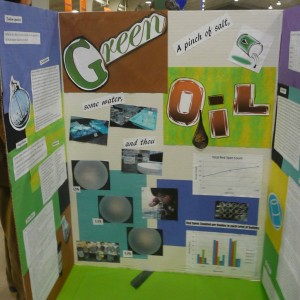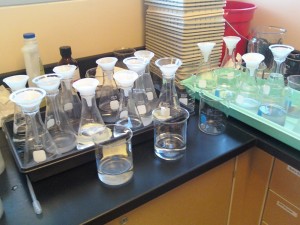Over the course of the semester, PCURs will reflect on the professors, advisers, and friends who shaped their research experiences. We present these to you as a series called Mentorship in Research. Most undergraduates have met, or will meet, an individual who motivates and supports their independent work. Here, Stacey shares her story.
~~~~~~

I really didn’t want to stay for the awards ceremony at the science fair that day, but Mrs. Sabherwal insisted. I told her I had to go to my clarinet lessons. No luck. I asked my mom to plead my case. No luck. She only offered, “It’s okay if you miss your lessons today”—and so, defeated, I waited at the fair.
And what an arduous wait it was. I couldn’t sit still—I just wanted to leave, and I was starting to get hungry. They kept calling names and more names. Names and more names. Were they done yet? I left and used the bathroom. But there was a flurry as I emerged, hands still damp with residual sink water—come quick, they told me, they’re calling your name! The highest award in the district science fair! Impossible. It turns out that Mrs. Sabherwal had confided in my mom about the award and expressly requested that I remain.
Mrs. Sabherwal was like that—always looking out for her students, no matter how frustratingly obstinate. She pushed me to become a researcher even when I didn’t realize I could be one.
Mrs. Sabherwal was my biology teacher in 10th grade and one of the most active proponents of the science fair at our school. She assigned the science fair as an extra credit project in her class and made quite the convincing case for it. Many students—me included—made the choice to sign up.
That didn’t mean I had fully prepared myself to conduct a research project. I remember coming up to her after school with possible project ideas and several supporting articles, as she had requested. She pushed me on the questions. Why did I think my hypotheses were correct? Were there other factors I was ignoring?
That’s the power of a mentor. Someone who believes in you and because of that, makes you believe in yourself.
That was frustrating. Did Googling a few articles not constitute sufficient “research”? Wasn’t the science fair about testing hypotheses you already intuitively suspected were right? I didn’t want to set myself up for failure!

I was slightly disgruntled but doubled back on my research. Once I had decided on my topic—testing the effect of salinity on algae growth—Mrs. Sabherwal sprang into action. Despite the little time, funding, and space we had, she transformed her back storage room into a makeshift lab that could house several science fair experiments. I spent so many afternoons in that back lab with my classmates as we each hunched over our own projects, watching the sun creep lower and lower behind the mountains even as our frustration crept ever higher.
It was hard, but Mrs. Sabherwal encouraged me through those frustrations, even when I resented it. Sometimes I felt like my efforts were futile and her encouragement was water to a plant that was already dead. Just let me fail, I wanted to say. Let the important researchers handle the big questions.
It was fortuitous that she continued to push me forward, because I found confidence through the science fair. After my award at the district science fair, I won again at the county science fair, which placed me at the state fair. I stopped winning there, but I was driven to try again, do better next year, work harder—and I did.
Mrs. Sabherwal was there with me the entire way. Because she pushed me to realize the potential I didn’t know I had, she set me on a path to Princeton and beyond. That’s the power of a mentor. Someone who believes in you and because of that, makes you believe in yourself.
–Stacey Huang, Engineering Correspondent

